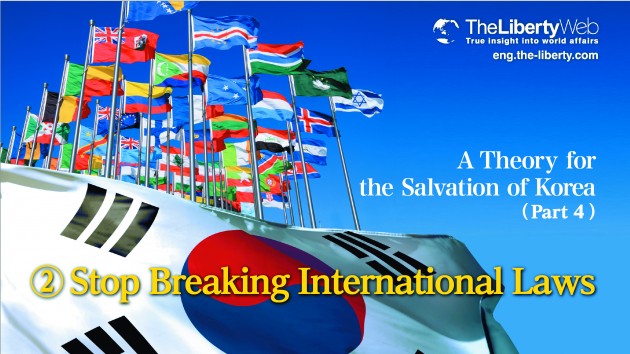A Theory for the Salvation of Korea (Part 4)
②Stop Breaking International Laws
Korea acts in a pre-modern way when it
●Ignores the rules of the international community
To modernize, Korea should attempt to
●Understand the historical background of international law
From the illegal occupation of Takeshima to the fabrication of the comfort women, and to the compensation problems over factory recruitment during the war, it’s well known that Korea often ignores international rules. Moreover, last year at the East Asian Cup’s match between Japan and Korea, the Korean cheering squad brought a banner that depicted An Jung-geun. It read, “There’s no future for people who forget their history,” and people around the world furrowed their brows. The Koreans displayed their total lack of common when they raised their diplomatic matters at an international sports event.
Yukichi Fukuzawa singled out this issue as problem in the Joseon era, and Korea hasn’t changed much in this regard. During the period of national isolation in Japan, there still were some exchanges that occured with Western countries such as the Netherlands, but the isolation period in Joseon was pervasive. Korea only did business with China and Tsushima and Ryukyu from Japan.
As a result of that situtation, they perhaps lacked knowledge of proper diplomatic protocols. When the Meiji government sent a national certificate, the Koreans refused to accept it, and they sent it back. When they apparently saw words like the “emperor,” they then thought that it was an insult directed at the Qing dynasty. After the Japan-Korea Treaty of Amity was made, too, they couldn’t understand what it meant to allow each other’s ministers to reside in each other’s countries. They kept refusing over this point.
The Korea of today has produced people like UN Secretary-General Ban Ki-moon, but even his statements have been lacking in neutrality such as when he announced, “I’ll do my best to contribute to the expansion of the national power of South Korea,” or that ” the Japanese government and their political leaders need to look deeply within their organizations to discover how to cultivate international and forward-looking visions of themselves.” Ki-moon has been creating problems from his position time and again.
Why Korea Should Inspect Its History to Understand International Law
Korea will learn international rules when it reviews its historical record in a proper fashion.
When the Koreans protested against Japanese citizens’ visits to Yasukuni shrine, they interfered in Japan’s domestic affairs. When Japanese people in Japan visit a shrine such as Yasukuni, they are permitted to remember the heroic spirits of their ancestors Korea was even a part of Japan during the Pacific War. Many Koreans fought as Japanese soldiers. If one were to be specific, then Yasukuni Shrine would include fallen Korean soldiers, too.
Many peace treaties have historically existed in the world because people have had to “settle out of court” and they’ve started new relationships afterwards. It has been the way of the world, and people have established this path as a form of international rule.
When the Vietnam War broke out in 1960s, Korea entered the war on the side of Americans, and they committed myriad atrocities towards the Vietnamese. However, after they signed the Paris Peace Agreement in 1973, America and Vietnam made no apologies nor did they hand out compensations. In fact, the Vietnamese government never asked for anything.
The international community should put up safeguards when a country does not keep the rules. It’s common sense. If Korea wants to ignore the Japan-Korea Basic Treaty, Japan should charge Korea the 21 trillion 8 hundred billion yen (which should be calculated again in present-day values) in assets and savings that the Korean Peninsula left during the Annexation era (based on numbers from Kunitoshi Matsuki’s “In Reality the ‘Japan-Korea Annexation’ Saved Korea”). It’d also be a good opportunity for the international community to understand the achievements of Japanese government from the Annexation time period.
Depsite all sorts of national emotions, Korea ought to comprehend that the duty of government is to control its citizens and to observe international rule especially since Korea wishes to live as a part of the international community.



















